Montana-based Jestunma Teaching Worldwide
Written by: Amanda Taylor
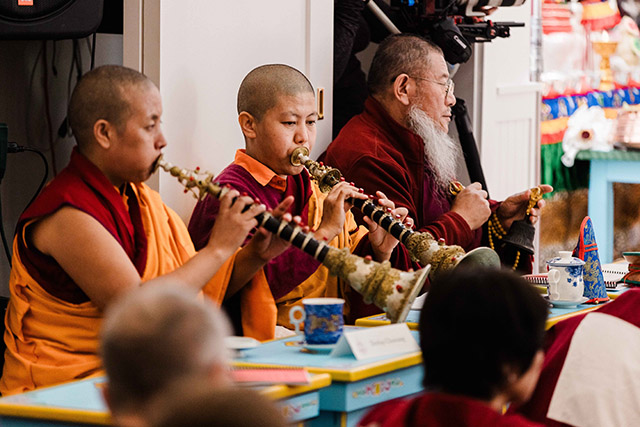
Jetsünma and Dorlop Chönyi Sangmo playing traditional instruments during a ceremony at the Namchak Retreat Ranch.
Photo credit: Greendoor Photography
Jetsünma Jamyang Dolma, an inspiring female Tibetan-ancestry teacher based in Western Montana, is expanding her teaching schedule locally and across the country.
Jetsünma spent nearly 12 years studying and practicing Buddhist teachings, and nine years in retreat, before becoming a teacher. Typically, she teaches in Montana, California, New Mexico, Nepal, India, and, as she says, “wherever I’m invited to teach.”
In 2025 she will teach in various Namchak Community programs in Western Montana, including the Compassion in Action Fellows Program and multiple weekend retreats. She is a sangha member and teacher at the Ewam Garden of One Thousand Buddhas in Arlee, Montana, and will teach at the Ewam Buddhist Institute there in July. In addition, she will teach the Nyingthig cycle, a set of teachings and practices in Nyingma tradition of Tibetan Buddhism, at the Ewam Kusum Ling Center in Humboldt County, California.
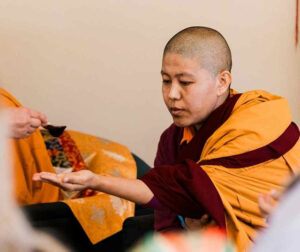
Currently and until June 2025, Jetsünma is offering weekly online teachings about foundational Buddhist topics through Ewam in Montana. She recently taught at Namchak’s Compassion in Action Summer Immersion Retreat, and taught on the three poisons as a stand-alone teaching. In the past year, she taught at the Ewam Buddhist Institute, and also gave classes on grief and bereavement for Transitional Life Care in Montana.
Jetsünma received a great deal of her training at Kusum Khandroling Retreat Center, a part of Ewam India Nubchen-gon Nunnery. This was under the guidance of Tulku Sangak Rinpoche, the spiritual director of the Namchak Foundation and Ewam.
Historically Tibetan Buddhist traditions have tended to be patriarchal, with far fewer female teachers than male. But now Tibetan teachers working in the modern West, including Tulku Sangak Rinpoche, have marked respect for women as teachers, recognizing their strengths.
Jetsünma’s journey to becoming a teacher began in the Mainpat Tibetan Refugees Community in India, where she was born and raised.
When she was an infant, Beru Khyentse Rinpoche and a group of Kagyu masters recognized her as a reincarnation of Gelongma Kechog Palmo (Freda Bedi), who was a women’s rights activist, professor, and one of the first Westerners to be ordained as a Tibetan Buddhist nun.
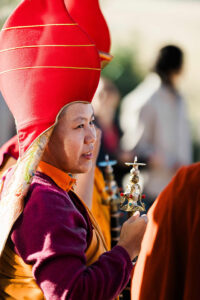
Jetsünma’s mother, Pema, kept the reincarnation a secret from Jetsünma. Though Pema is a devout Tibetan Buddhist, she wanted her daughter to receive a full education and to have a choice about following the monastic path. At that time, women were not recognized as lamas or given any positions within Tibetan Buddhism, so Pema could not accept the idea of giving her baby to a nunnery.
Jetsünma explained that she was “just a normal high schooler when she started high school.” That was until 10th grade, when an elderly nun and high school administrator approached Jetsünma, asking her to become a caretaker at the Tilopa Drupgyuling Nunnery, the first nunnery created for exiled Tibetan Buddhists. Jetsünma hesitantly replied, “I need time to think about that. I cannot decide right away.” The nun agreed to give her time and gave her a small book called “Last Days of Sister Palmo,” a short biography of Gelongma Khehog Palmo (Freda Bedi).
As Jetsünma read the biography, her future became clear. “I felt the calling. I have to carry on the work from my past life. I have to help spread Buddhism in the East and West.”
The rest is history.
She became a nun in 11th grade and completed high school in full nun attire.
After high school, she spent three years at Tilopa Drupgyuling Nunneryi in India, and another nine years studying Buddhist philosophy at Tsogyal Namdrol Shedrub Tharjayling Nunnery, also located in India. While Jetsünma was academically successful, she was surprised to find herself fraught with doubt about the monastic life.
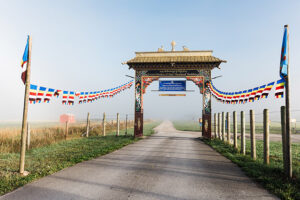
“I had never encountered gender segregation in my school or my family,” she said. “Seeing the imbalances in this religious community regarding education, position, and leadership was challenging. I thought, ‘Why can’t an ordinary female who’s realized and learned be acknowledged as a lama and a teacher by the Buddhist religious and lay community? Why can’t an accomplished female practitioner rise solely on her merits?’”
Struggling to digest the gender imbalances, she decided, “I will graduate for now. But then I will go to a retreat center and try to find the truth of teachings by myself.”
Auspiciously, Jetsünma’s uncle, Tulku Sangak Rinpoche, was leading a three-year retreat at Kusum Khandroling Retreat Center, a part of Ewam India Nubchen-gon Nunnery. Jetsünma smoothly transitioned into the retreat, receiving full guidance and teachings from Rinpoche, and pursued her path to uncover the truth for herself.
During that time, she returned to one of the main tenants of the Vajrayana path: that everyone is a deity.
“So, in terms of a deity, males and females are the same. It proved that what I saw was not the right thing,” Jetsünma said. “Whatever imbalances I see nowadays, it’s because of social pressure, environmental influences, and culture. Those aren’t the real practices of a buddha.”
After she completed her first three-year retreat, Tulku Sangak Rinpoche awarded her the title Jetsünma, which means venerable: exalted in both the studies and practices. That title carries important responsibilities. When a practitioner is appointed Jetsünma, they are required to take action for the welfare of others.
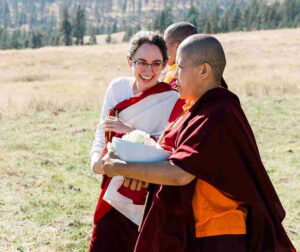
After nine years of retreat, she felt almost ready to be a teacher in the West. To better understand the culture and mentality of Westerners, she moved to Boston and spent two years studying English, sociology, psychology, medieval history, and world religions at Harvard University and at a community college. When asked about her favorite subject, she smiled and said, “I loved all of them. They are all indispensable subjects that complete each other.”
After two years of studies, she understood Westerners better and felt comfortable with English. With that, she started teaching in the U.S., where she continues to teach today.
Looking to the future, Jetsünma aspires to remain a flexible teacher who can teach to the masses.
“I don’t want to label myself as a teacher who only teaches profound practices for enlightenment,” she said. “I also want to help people release themselves from the stresses of their daily lives.”
“My goal is to create more good people even if they don’t have the intention of enlightenment. When I teach to our nuns, I say, ‘I don’t know if you will be a nun for your entire life.’ And I always tell them, ‘We have to be good human beings, and we have to create good human beings, even if you decide to stop being a nun.’”
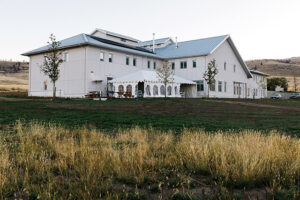
Reflecting on her journey to becoming a teacher and the gender discrepancies she experienced, she said, “The imbalances are decreasing. We are advancing with time. Nowadays, there are more women’s institutes with female teachers. And more female teachers are receiving the title of khenmo, which is someone who has graduated and completed all of their seminary studies.”
By embracing the role of teacher, she has honored her spiritual lineage and worked to dismantle gender biases, paving the way for other women in Buddhism. Her teachings, whether focused on enlightenment or easing daily struggles, demonstrate her deep compassion and commitment to positive change. Jetsünma’s vision for a more inclusive and compassionate future shines through her work, inspiring countless students and embodying the core principles she holds dear.
To learn more about the programs Jetsünma is involved in, use the contact info below:
- Namchak (Montana): info@namchak.org
- Ewam Garden of One Thousand Buddhas (Montana): admin@ewam.org
- Ewam Kusum Ling (California) : email ewamksl@gmail.com
Amanda Taylor has been deeply dedicated to sharing Namchak’s mission and vision for over five years. She lives in Missoula, Montana, and is the marketing communications manager at Namchak.
